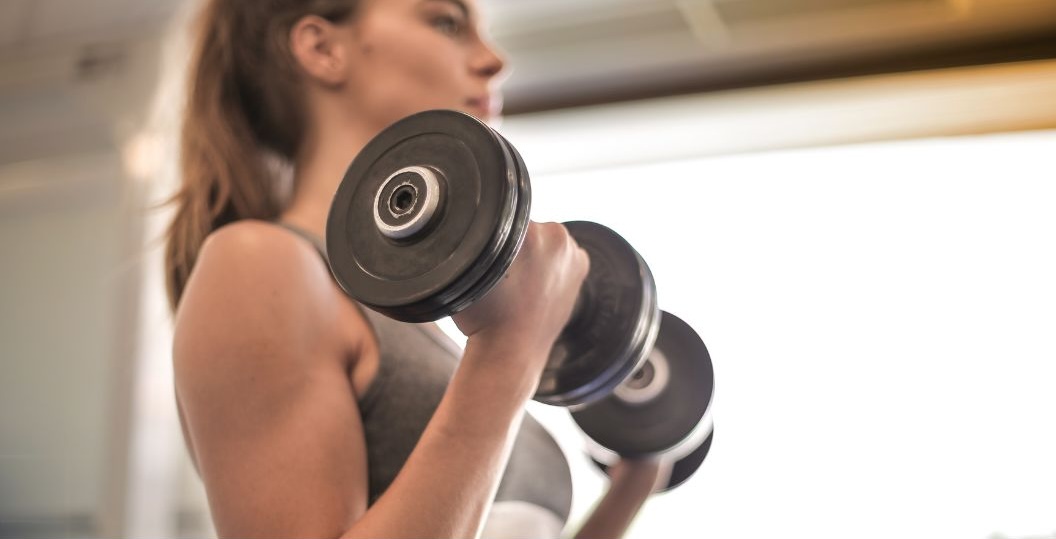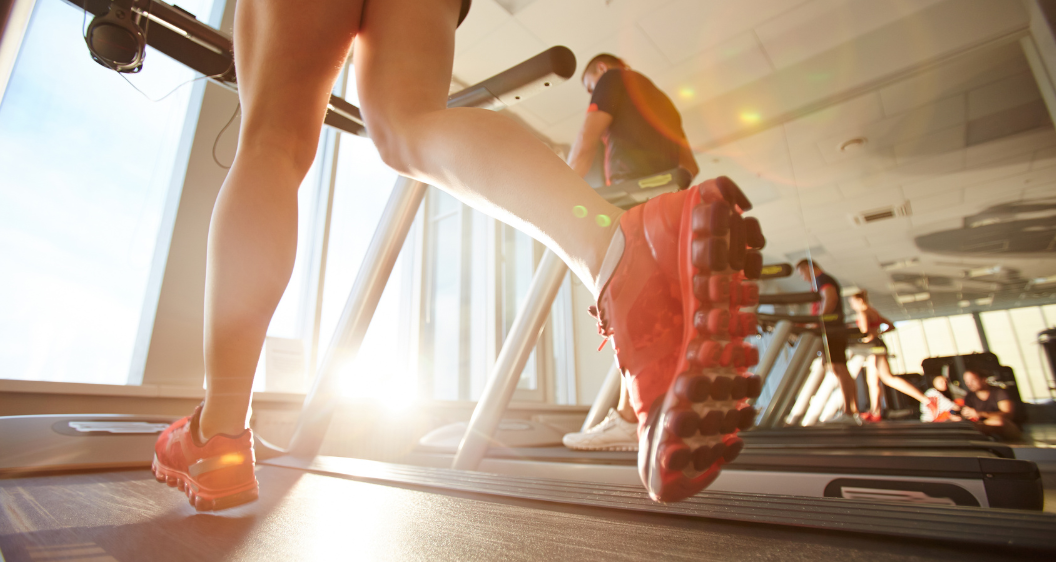
Is it a good idea to eat before a workout? The simple answer is YES.
If you're a woman over 35 looking to get the most out of your workouts, what you eat before and after exercise can make a huge difference.
Eating the right foods can give you enough energy, help build muscles and aid recovery. Let’s dive into what you should munch on before and after breaking a sweat.
*This blog is also based on tips from Dr. Stacy Sims on the Andrew Huberman podcast.
Why Pre- and Post-Workout Nutrition Matters for Women Over 35
As we age, our bodies undergo several changes. For women over 35, metabolism can slow down, muscle mass can decrease, and recovery can take longer.
Proper nutrition before and after workouts helps combat these changes by providing the necessary fuel for energy, supporting muscle maintenance and growth, and aiding in quicker recovery.
This is crucial for maintaining a healthy, active lifestyle and achieving fitness goals, whether it’s weight loss, muscle building, or overall wellness.
Related Blog: Ways to Boost Metabolism and Food List for Women Over 40
Pre-Workout Nutrition
When to eat: Aim to eat 1-3 hours before your workout. Eating too close to exercise might cause stomach discomfort.
What to Focus on: Carbohydrates and a little bit of protein. Carbs are your body's main source of energy, while protein helps prevent muscle breakdown.
Best Pre-Workout Meals
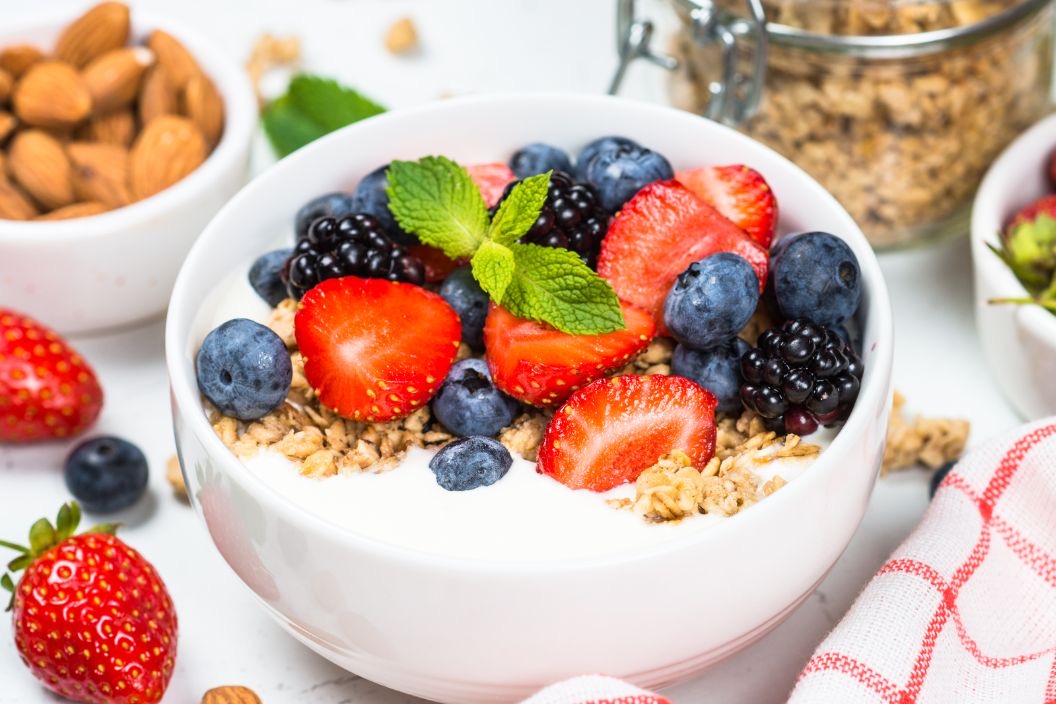
1. Greek Yogurt with Fruit:
- Why: This is a balanced meal with protein from the yogurt and quick energy from the fruit.
- Example: A bowl of Greek yogurt topped with berries or banana slices.
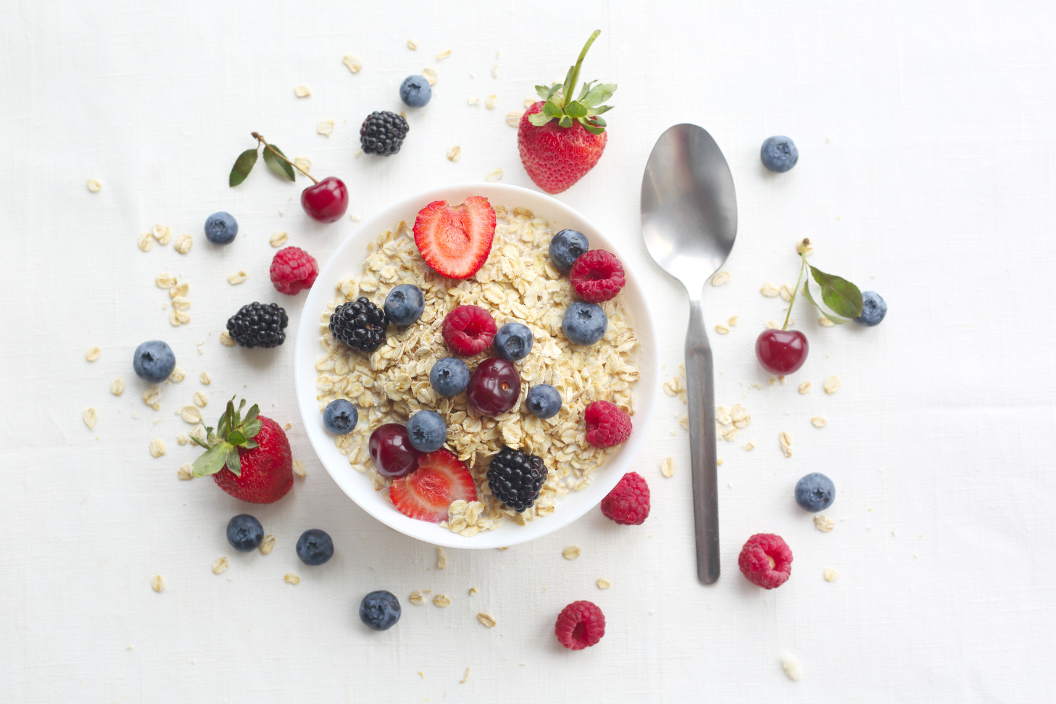
2. Oatmeal with a Scoop of Protein Powder:
- Why: Carbs from oatmeal and protein from the powder give you sustained energy.
- Example: A serving of oatmeal mixed with a scoop of your favorite protein powder.
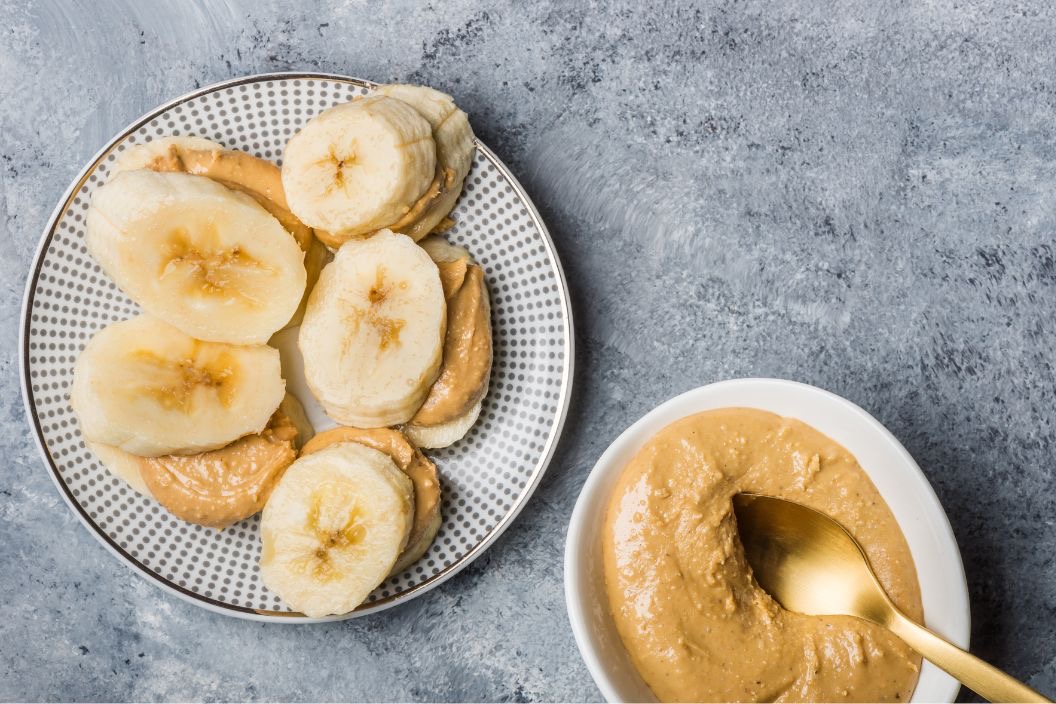
3. Banana with Nut Butter:
- Why: Quick and easy! The banana provides carbs, and the nut butter adds healthy fats and protein.
- Example: A banana sliced and spread with almond or peanut butter.
Post-Workout Nutrition
When to eat: Eat within 30-60 minutes after your workout.
What to Focus on: Protein and carbs. Protein helps repair muscles, and carbs replenish your glycogen stores (the energy stored in your muscles).
Best Post-Workout Meals
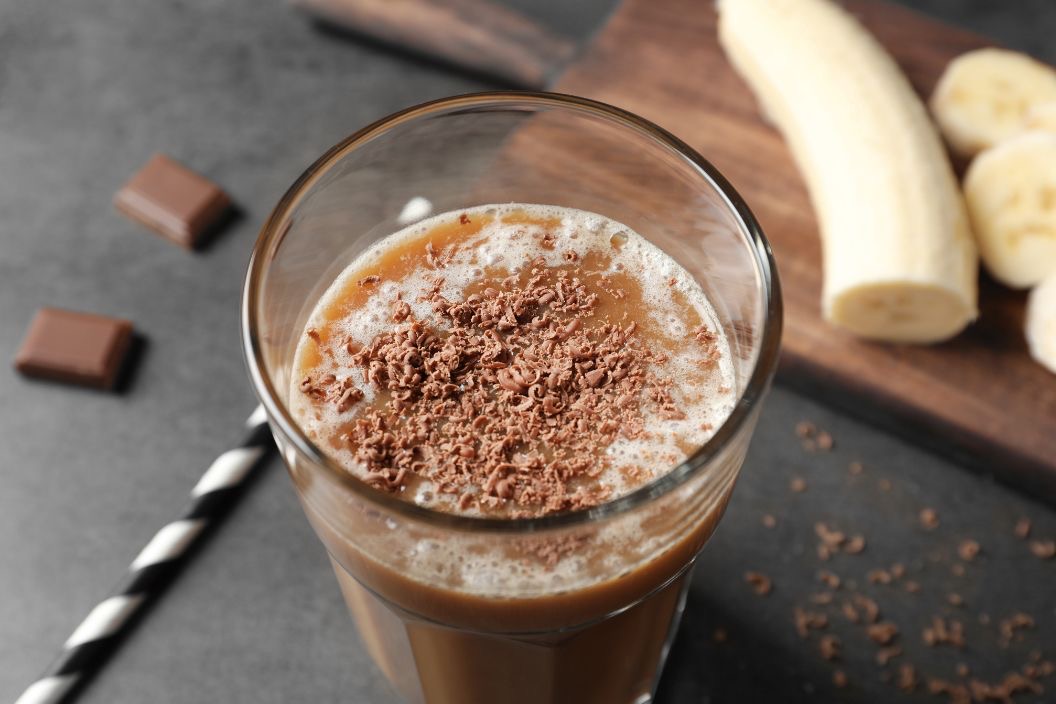
1. Protein Shake with a Piece of Fruit:
- Why: Quick protein from the shake and carbs from the fruit help restore glycogen levels.
- Example: A protein shake made with your favorite protein powder and a piece of fruit like an apple or banana.
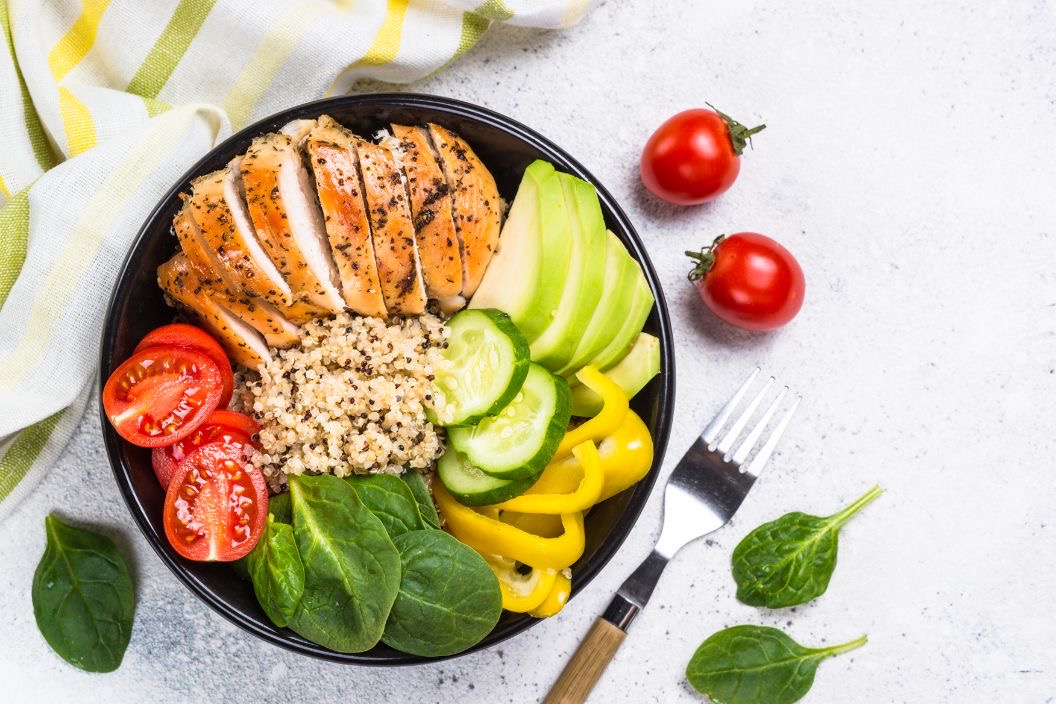
2. Chicken Breast with Quinoa and Vegetables:
- Why: A balanced meal with lean protein, complex carbs, and veggies.
- Example: Grilled chicken breast served with a side of quinoa and steamed vegetables.
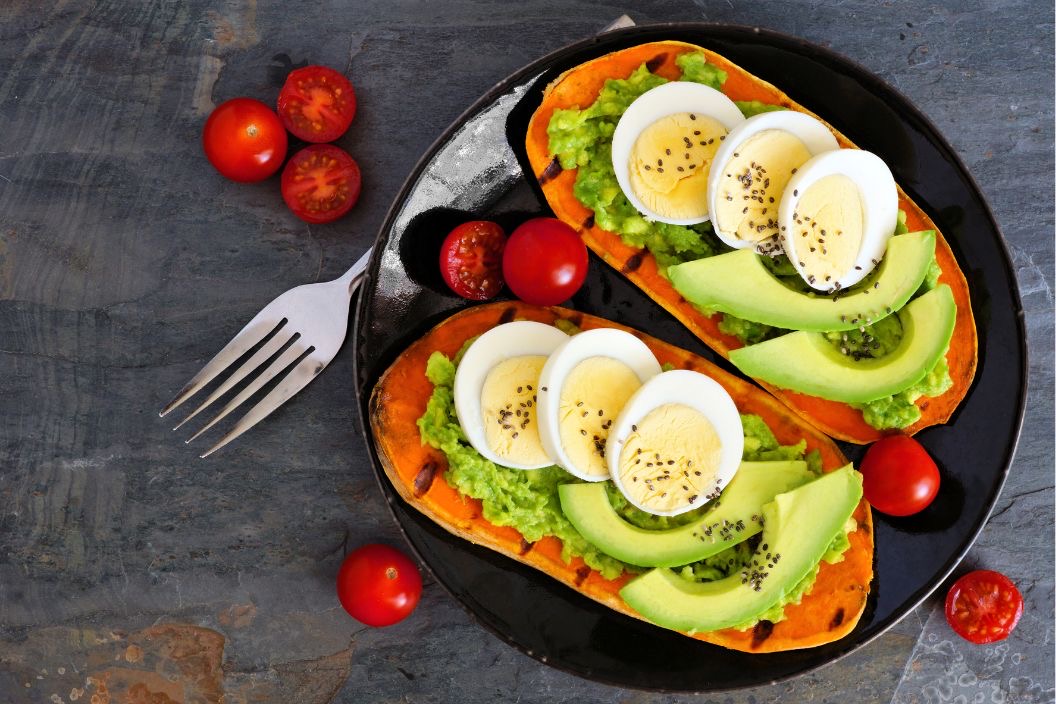
3. Eggs with Sweet Potato:
- Why: Protein from eggs and carbs from sweet potatoes for muscle recovery and energy replenishment.
- Example: Scrambled eggs with a side of roasted sweet potatoes.
Additional Tips
- Hydration: Drink water before, during, and after your workout to stay hydrated.
- Electrolytes: For longer or more intense workouts, consider including electrolyte-rich beverages or foods.
Tailoring Nutrition to Your Goals
Regarding pre-and post-workout nutrition, one size does not fit all. Tailoring your nutrition to your specific fitness goals—weight loss, muscle growth, or overall health—is crucial for achieving the best results.
Here's what is important to customize your diet based on your workout goals, especially for women over 35.
1. Weight Loss Goals
Those aiming to lose weight should focus on creating a calorie deficit while maintaining energy levels for workouts. Here's how tailored nutrition helps:
-
Energy Balance:
To lose weight, you need to burn more calories than you consume. However, it's essential to have enough energy for your workouts to maintain performance and avoid fatigue.
How: Choose nutrient-dense foods that are lower in calories but high in vitamins, minerals, and fiber. For example, opt for fruits, vegetables, and lean proteins.
-
Metabolism Support:
As you age, your metabolism may slow down, making weight loss more challenging. Proper nutrition can help boost metabolism.
Include plenty of protein in your diet to support muscle mass and enhance metabolic rate. High-protein foods like Greek yogurt, cottage cheese, and lean meats are excellent choices.
-
Satiety and Cravings:
Controlling hunger and cravings is vital for sticking to a weight loss plan.
Focus on *complex carbohydrates and healthy fats that keep you fuller for longer. Foods like oatmeal, sweet potatoes, and nuts can help you stay satisfied.
-
Example Meal:
Pre-Workout: Greek yogurt with berries (*simple carbohydrates) and a drizzle of honey.
Post-Workout: Grilled chicken breast with a side of quinoa (*complex Carbohydrates) and steamed vegetables.
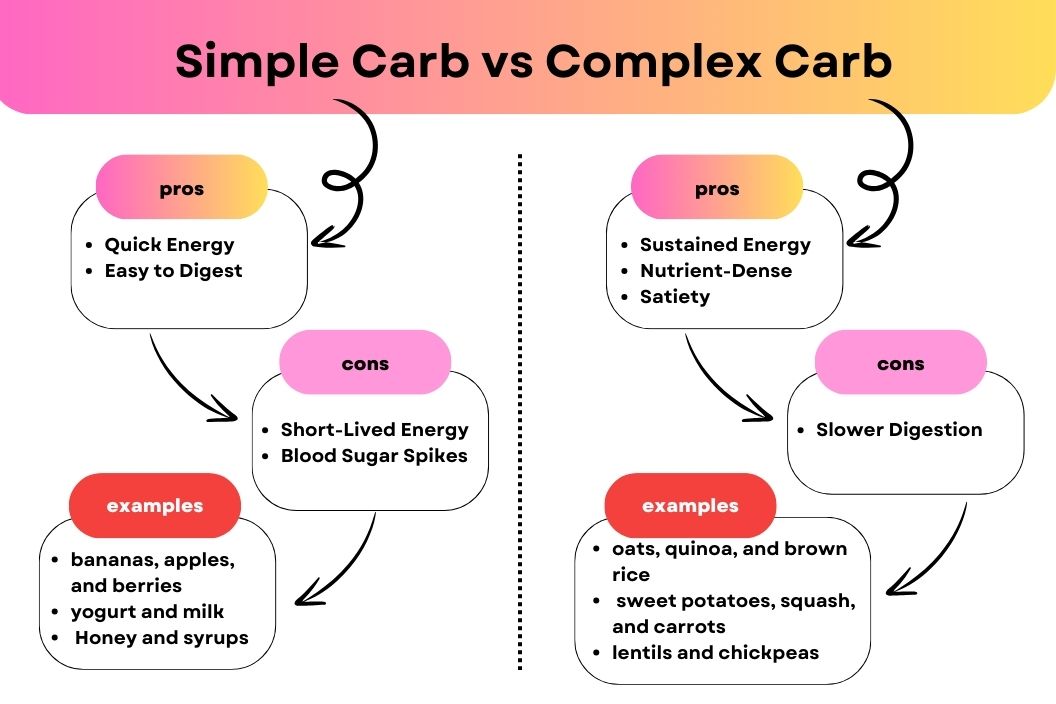
*Simple Carbohydrates :
Pros:
- Quick Energy: Simple carbs give you a fast energy boost. Great for quick, high-intensity workouts.
- Easy to Digest: They’re easy on your stomach, reducing the risk of discomfort during exercise.
Cons:
- Short-Lived Energy: The energy doesn’t last long, which might not be enough for longer workouts.
- Blood Sugar Spikes: They can cause a quick rise and fall in blood sugar levels.
Examples:
- Fruits like bananas, apples, and berries
- Dairy products like yogurt and milk
- Honey and syrups
*Complex Carbohydrates:
Pros:
- Sustained Energy: They provide a steady release of energy, perfect for longer workouts.
- Nutrient-Dense: Packed with fiber, vitamins, and minerals, contributing to overall health.
- Satiety: They keep you feeling full longer, preventing hunger during your workout.
Cons:
- Slower Digestion: They take longer to digest, so not ideal if eaten right before a workout.
Examples:
- Whole grains like oats, quinoa, and brown rice
- Vegetables like sweet potatoes, squash, and carrots
- Legumes like lentils and chickpeas
2. Muscle Growth Goals
For those focused on building muscle, the emphasis should be on providing the body with the nutrients it needs to repair and grow muscle tissue. Here's how tailored nutrition helps:
-
Protein Intake:
Protein is essential for muscle repair and growth. Consuming adequate protein helps stimulate muscle protein synthesis.
How: Aim for meals rich in protein, such as protein shakes , eggs, and cottage cheese. Incorporate around 20-30 grams of protein per meal.
-
Carbohydrate Timing:
Carbs provide the energy needed for strength training and help replenish glycogen stores post-workout.
How: Include complex carbohydrates before your workout for sustained energy and simple carbs post-workout for quick recovery.
-
Nutrient Timing:
Timing your meals can maximize muscle repair and growth.
How: Consume a pre-workout meal with a good balance of carbs and protein 1-3 hours before exercising, and a post-workout meal within 30-60 minutes after.
-
Example Meal:
Pre-Workout: Oatmeal with a scoop of protein powder and a banana.
Post-Workout: Protein shake with a piece of fruit, followed by a meal of salmon, brown rice, and broccoli.
3. Overall Health and Fitness Goals
If your goal is to maintain overall health and fitness, a balanced diet that supports energy levels, muscle strength, and general well-being is key. Here's how tailored nutrition helps:
-
Balanced Diet:
A balanced diet provides all the necessary nutrients for optimal performance and health.
How: Include a variety of foods from all food groups—proteins, carbs, fats, fruits, and vegetables.
-
Hydration and Electrolytes:
Staying hydrated is crucial for overall performance and recovery.
How: Drink enough water before, during, and after workouts. Consider sports drinks or electrolyte-rich foods for longer or more intense exercise.
-
Preventing Injuries:
Proper nutrition helps strengthen muscles and joints, reducing the risk of injuries.
How: Include foods rich in healthy fats and antioxidants, such as nuts, seeds, and colorful fruits and vegetables.
-
Example Meal:
Pre-Workout: Whole grain toast with peanut butter and sliced banana.
Post-Workout: Scrambled eggs with spinach and a side of sweet potato.
Why Tailoring Nutrition is Important for Women Over 35
1. Hormonal Changes:
- Why: Women over 35 may experience hormonal changes that can affect metabolism, energy levels, and muscle mass.
- How: Tailored nutrition can help manage these changes by providing the right balance of nutrients to support hormonal health.
2. Bone Health:
- Why: As women age, bone density can decrease, increasing the risk of osteoporosis.
- How: Ensure adequate calcium and vitamin D intake through foods like dairy products, leafy greens, and fortified foods.
3. Recovery and Injury Prevention:
- Why: Recovery may take longer as you age, and the risk of injury can increase.
- How: Proper nutrition aids in faster recovery and helps maintain muscle and joint health, reducing injury risk.
Type of Workout Nutrition
Strength Training
1. Eat a Balanced Diet:
- Why: Include a mix of protein, carbs, and healthy fats to support muscle repair and growth.
- Example: A meal of grilled chicken, brown rice, and steamed veggies.
2. Stay Hydrated:
- Why: Drink enough water before, during, and after workouts to maintain performance.
- Example: Carry a water bottle and sip regularly throughout your workout.
3. Timing Is Key:
- Why: Plan your meals and snacks around your workout schedule for the best results.
- Example: Have a pre-workout snack an hour before exercise and a post-workout meal within 30 minutes of finishing.
Cardio Workouts
1. Quick Energy Foods:
- Why: Simple carbs like fruits and sports drinks can help maintain energy levels.
- Example: Eat a banana or a small handful of dried fruit before your run.
2. Stay Hydrated:
- Why: Keep a water bottle handy and sip throughout your workout.
- Example: Drink water or a sports drink to replace lost fluids and electrolytes.
3. Recovery Foods:
- Why: After your cardio session, have a protein shake or a meal with a good mix of protein and carbs.
- Example: A smoothie made with protein powder, spinach, and berries.
Common Questions About Pre- and Post-Workout Nutrition
Should I Eat Before a Morning Workout?
1. Yes, but Keep It Light:
- Why: Eating a small snack can help you avoid feeling weak or dizzy during your workout.
- Example: A banana or a small piece of fruit with a spoonful of peanut butter.
2. Stay Hydrated:
- Why: Drink a glass of water before you start your morning workout.
- Example: Keep a water bottle by your bed to sip on when you wake up.
What If I Have a Sensitive Stomach?
1. Choose Easily Digestible Foods:
- Why: Some foods are easier on the stomach and less likely to cause discomfort.
- Example: Greek yogurt, oatmeal, or a banana.
2. Avoid High-Fat Foods:
- Why: High-fat foods can take longer to digest and may cause stomach upset.
- Example: Skip the greasy breakfast and opt for something lighter.
Eating the right foods before and after your workouts is essential for women over 35 to achieve their fitness goals.
Whether you want to lose weight, build muscle, or just stay healthy, paying attention to your nutrition can help you get better results.
Remember, it's not just about working hard in the gym; it's also about fueling your body with the right nutrients. So next time you plan your workout, think about what you'll eat before and after to maximize your performance and recovery.
Happy exercising!

